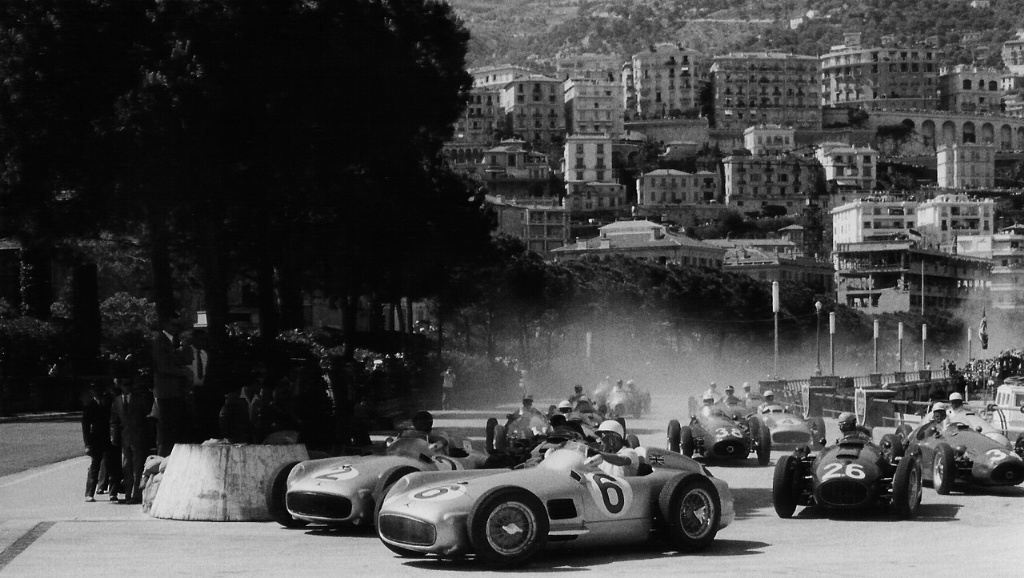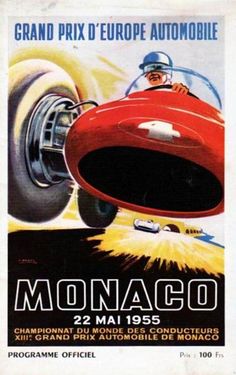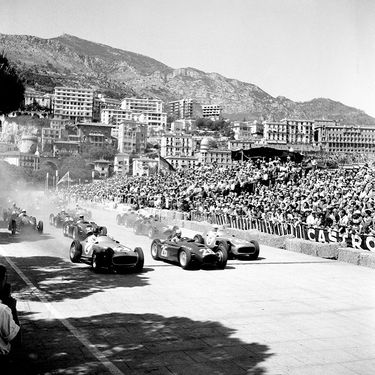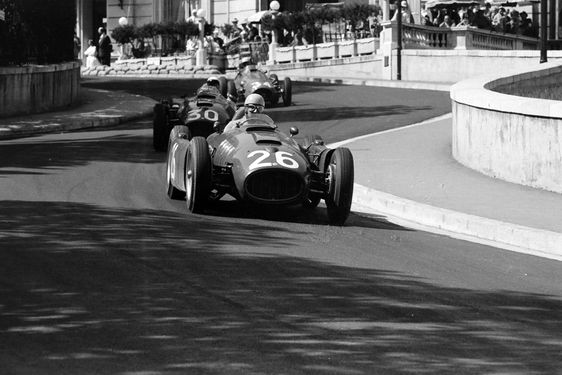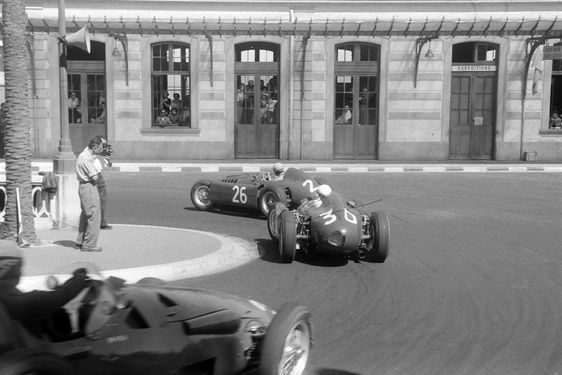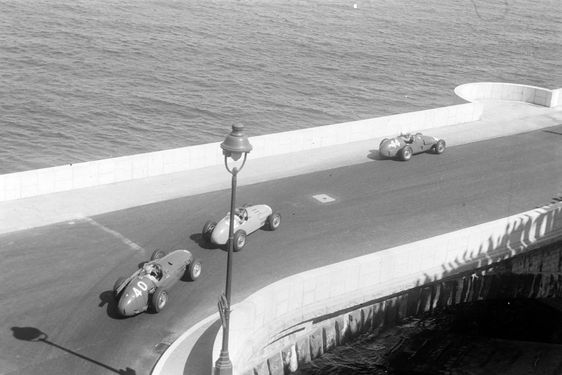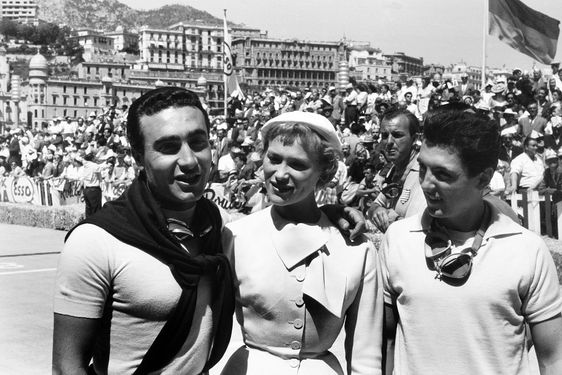1955 Monaco Grand Prix (partially found footage of Formula One World Championship race; 1955): Difference between revisions
No edit summary |
No edit summary |
||
| Line 72: | Line 72: | ||
{{reflist}} | {{reflist}} | ||
[[Category:Lost sports events]] | [[Category:Lost recordings of sports events]] | ||
[[Category:Partially found media]] | [[Category:Partially found media]] | ||
[[Category:Historic]] | [[Category:Historic]] | ||
Revision as of 22:07, 24 January 2023
The 1955 Monaco Grand Prix was the second race of the 1955 Formula One Season. Occurring on 22nd May at the Circuit de Monaco, the race was ultimately won by Ferrari's Maurice Trintignant, achieving his first victory in the sport. The event is also famous for a crash involving Lancia's Alberto Ascari, who ended up falling into the harbour.
Background
The 1955 Monaco Grand Prix was the 2nd running of the event as part of Formula One following its debut on the calendar in 1950.[1] It was also the 13th in Grand Prix history.[2][1] Lasting 100 laps,[3] the Monaco Grand Prix remains an integral event of the Formula One calendar, including being prestigious enough to be classified as part of the Triple Crown of Motorsport, alongside the 24 Hours of Le Mans and the Indianapolis 500.[1][4]
Heading into the race, Mercedes-Benz entered two special versions of its W196.[5] Both had shorter wheelbases, with the inboard brakes mounted on the wheel hubs.[5] This helped save weight, while also being an attempt by Mercedes to handle the difficult turns present at Monaco.[5] But because the German manufacturer lacked much knowledge on the handling of their new designs, they opted to modify them further to accommodate its drivers Juan Manuel Fangio and Stirling Moss.[5] Elsewhere, Lancia were seeking to challenge Mercedes, including by providing a fourth car to Monégasque driver Louis Chiron.[6][5] Ferrari entered both 625s and new 555s for the race, with the majority of its drivers relying on the older car.[6][5][7]
In qualifying, Fangio set the pace by claiming pole position with a time of 1:41.1.[7][5][6][3] Lancia's Alberto Ascari was narrowly behind in second, being joint-fastest with Fangio but having set his later than the Argentine.[6][5][7][3] In third was Moss, who was finding his Mercedes to be less competitive than Fangio's.[5][3][7][6] Indeed, whereas his car was more than two seconds slower than Fangio's, when he drove his teammate's car, he found he was only one-tenth behind.[6][5] Trintignant meanwhile qualified ninth in a Ferrari 625 with a time of 1:44.4, while Chiron successfully made the grid by qualifying 19th out of 20 competitors.[6][5][7][3] At 55 years and 292 days, he became the oldest driver to start a Grand Prix, a record that still stands today.[8] With only 20 spots on the grid available, it meant that Maserati's Lance Macklin and HWM-Alta's Ted Whiteaway failed to qualify after setting the slowest times, Macklin hampered by an oil leak during one session.[5][3] Additionally, Mercedes' Hans Herrmann injured one of his legs and lungs in an accident, preventing him from starting the event.[5]
The Race
With the starting order decided, the 1955 Monaco Grand Prix commenced on 22nd May.[3] Fangio maintained his lead from the start, while fourth place Lancia driver Eugenio Castellotti passed both Moss and Ascari to move into second.[5][7][3] Moss would move into second by lap 5, but by that point, Fangio already had a 7-second lead that he was continually extending.[5][7] Both Mercedes outclassed the field, with the gap between Moss and the others being nine seconds, Moss himself nine seconds behind his teammate.[5] Castellotti and Ascari duelled for third, while Trintignant challenged for sixth on lap 23.[5][7] By lap 35, Ascari was in third after Castellotti suffered a puncture from hitting a kerb, with Maserati's Jean Behra also encountering issues that required a pit stop.[5][7][6]
By this point, Fangio was more than 40 seconds ahead of Ascari, although Moss had since closed the gap.[5][7] 15 laps later however, Fangio retired following a transmission failure.[5][7][6][3] Moss took over in front, and had built such a gap over Ascari that he was soon to lap him as the race reached lap 81.[5][3] Ascari meanwhile was challenged by lapped Maserati driver Cesare Perdisa, with Moss looking to lap both Italians.[5][7] But after completing 81 laps, Moss' engine failed, forcing him into the pits.[5][7][6][3] Ascari therefore was set to inherit the lead, but not long afterwards slipped on oil from Moss' blown engine coming down the hill that saw him crash through a straw hale and sand-bag barrier.[5] Him and his car ending up falling into the harbour.[5][7][6][3] Ultimately, Ascari escaped drowning, but suffered shock and a broken nose.[5][9][6] This proved to be the two-time champion's final Formula One start; four days later, he was killed testing a Ferrari 750 Monza at the Monza Circuit, aged 36.[9][6]
With Moss and Ascari out, Trintignant moved into first, and remained there for the final 20 laps of the race.[5][7][6][3] He therefore claimed his first victory and eight points in the Drivers' Championship, which also led to him topping the Championship with 11.33 points.[5][6][3][10] It was a result considered unlikely by most, considering the performances of the Mercedes and Ascari relative to the Ferraris.[7][5][6] In second was Castellotti, with Behra finishing third after overtaking Ferrari's Nino Farina with 10 remaining.[7][3][5] Farina and Lancia's Luigi Villoresi finished in the final points positions of fourth and fifth respectively, while Chiron came home in sixth.[3][5][7][6] Moss pushed his Mercedes over the line to be classified ninth.[5][3]
Availability
The race was reportedly televised by TMC, although it is unknown whether it provided live coverage or race highlights.[11] The broadcast has yet to publicly resurface however, having originated from an era where telerecordings were rare until video tape was perfected in the late-1950s.[12] Nevertheless, substantial footage of the race is available, including in a film made by The D.A. Clarke Film Unit. Some photos can also be found online.
Gallery
Videos
Images
See Also
- 1953 British Grand Prix (partially found footage of Formula One World Championship race; 1953)
- 1953 Italian Grand Prix (partially found footage of Formula One World Championship race; 1953)
- 1954 British Grand Prix (partially found footage of Formula One World Championship race; 1954)
- 1954 Italian Grand Prix (partially found footage of Formula One World Championship race; 1954)
- 2005 San Marino Grand Prix (partially found ITV advert break during final laps of Formula One race; 2005)
- Donkey Does F1 (partially found photos of Shrek character inflatable at Formula One races; 2004)
- F-1 World Grand Prix III (lost build of cancelled Nintendo 64 Formula One racing game; 2000-2001)
- F1 2010 (lost pre-alpha build of Formula One game; 2010)
- F1 Racing Championship 2 (lost build of cancelled PC/PlayStation 2 Formula One game; 2001)
- Fernando Alonso's 2015 testing accident (lost footage of Formula One test session crash; 2015)
- Grand Prix 3 (lost build of cancelled Dreamcast port of PC Formula One racing game; 2001)
- Grand Prix 4 (lost build of cancelled Xbox port of PC Formula One racing game sequel; 2002)
- McLaren MP4-18 (lost footage of unraced Formula One car; 2003)
- Racing Arrows (partially found Formula One TV series; 2001)
- Robert Kubica's 2010 Japanese Grand Prix Q3 lap (lost audio of Formula One qualifying lap; 2010)
- Williams FW15C (partially found footage and lap time information of unraced CVT Formula One car; 1993)
References
- ↑ 1.0 1.1 1.2 F1 Chronicle detailing the history of the Monaco Grand Prix. Retrieved 10th Aug '22
- ↑ Ultimate Car Page providing a list of Monaco Grand Prix. Retrieved 10th Aug '22
- ↑ 3.00 3.01 3.02 3.03 3.04 3.05 3.06 3.07 3.08 3.09 3.10 3.11 3.12 3.13 3.14 3.15 3.16 Racing-Reference detailing the qualifying and race results of the event. Retrieved 10th Aug '22
- ↑ Topend Sports detailing the Triple Crown of Motorsport. Retrieved 10th Aug '22
- ↑ 5.00 5.01 5.02 5.03 5.04 5.05 5.06 5.07 5.08 5.09 5.10 5.11 5.12 5.13 5.14 5.15 5.16 5.17 5.18 5.19 5.20 5.21 5.22 5.23 5.24 5.25 5.26 5.27 5.28 5.29 5.30 5.31 Motorsport Magazine providing a detailed race report. Retrieved 10th Aug '22
- ↑ 6.00 6.01 6.02 6.03 6.04 6.05 6.06 6.07 6.08 6.09 6.10 6.11 6.12 6.13 6.14 6.15 6.16 Grand Prix Ferrari summarising the race and Ferrari's performance in it. Retrieved 10th Aug '22
- ↑ 7.00 7.01 7.02 7.03 7.04 7.05 7.06 7.07 7.08 7.09 7.10 7.11 7.12 7.13 7.14 7.15 7.16 7.17 Conceptcarz detailing the race and Trintignant's first victory. Retrieved 10th Aug '22
- ↑ The Forgotten Drivers of F1 detailing the career of Chiron and noting he became the oldest driver to start a Grand Prix. Retrieved 10th Aug '22
- ↑ 9.0 9.1 Motorsport Memorial page for Alberto Ascari. Retrieved 10th Aug '22
- ↑ Stats F1 detailing the Drivers' Standings following the race. Retrieved 10th Aug '22
- ↑ List of Formula One television broadcasts noting TMC provided some coverage, though it is unclear whether it was live or in highlights form. Retrieved 10th Aug '22
- ↑ Web Archive article discussing how most early television is missing due to a lack of directly recording television. Retrieved 10th Aug '22
